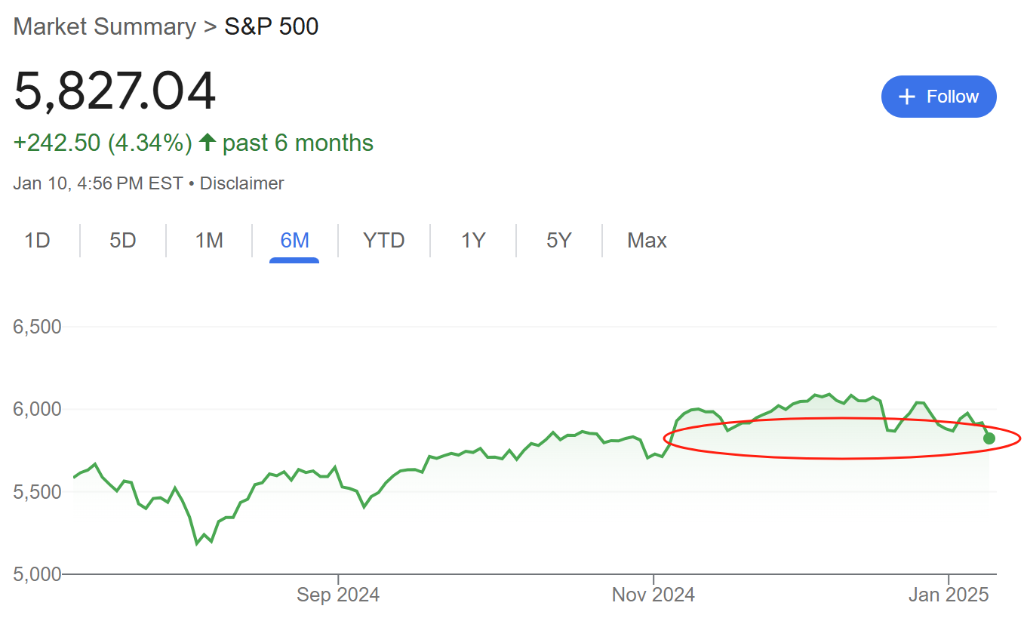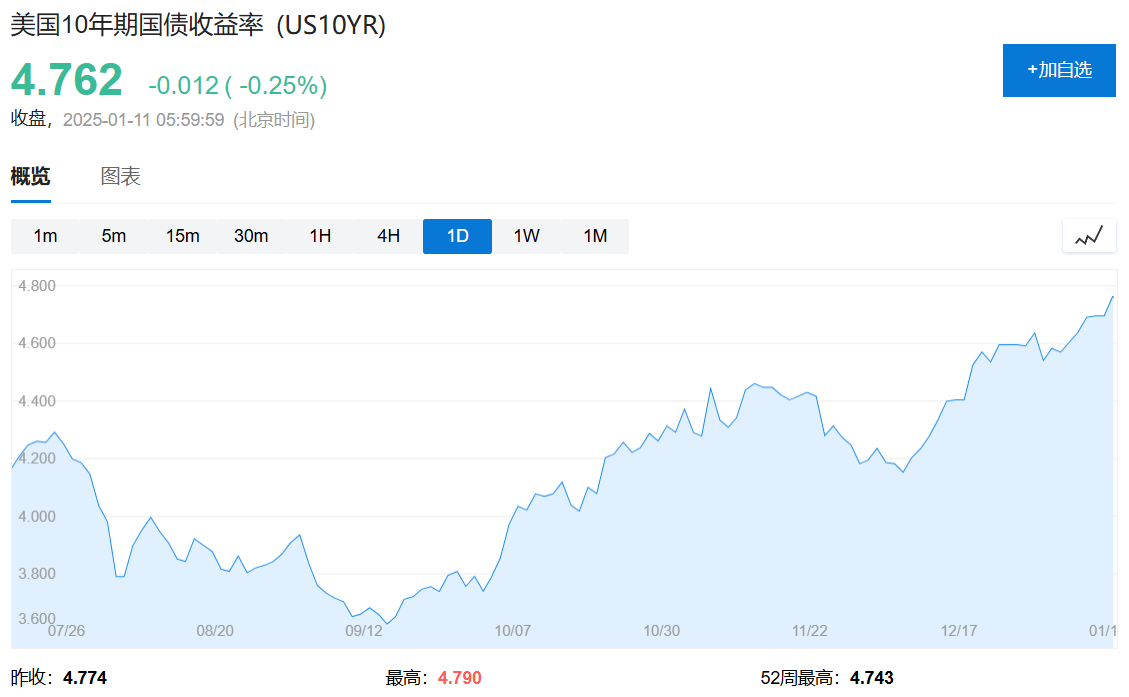- EasyCard
- Trade
- Help
- Announcement
- Academy
- SWIFT Code
- Iban Number
- Referral
- Customer Service
- Blog
- Creator
The US stock market is shocked by the "time reversal", and the scene before the election is repeated. Is the market reversal imminent?
Only 12 days have passed since 2025, and the US stock market has only traded for six trading days. The US stock market and US bonds “returned to pre-election overnight”.
The S & P 500 index hit a new low since November 5th last year on Friday, almost wiping out all gains since the US election, and may become the weakest performance of the US stock market from election day to inauguration day since Obama took office in 2009.

The US Treasury market has been sold off, with the 10-year US Treasury yield approaching its peak of 5%.

David Einhorn, founder of hedge fund Greenlight Capital, recently warned that the structure of the US stock market is “fundamentally collapsing.”
Even under the influence of a strong US dollar and high US bond yields, the Chinese stock and bond markets have been impacted to some extent.
Will there be a big market reversal next? The two major investment banks on Wall Street are targeting “end of January to February”.
1.After erasing the post-election gains, why did the US stock market “return to the pre-election level overnight”?
As the “Trump effect” fades, the gains of US stocks after the election have been completely wiped out. After Friday’s close, the S & P 500 index only rose 0.8% compared to the November 5th election.
In contrast, after Trump’s unexpected election in 2016, the S & P 500 index rose 6.2% between Election Day and Inauguration Day.
Analysts point out that this election lacks the surprises of 2016. In 2016, Trump unexpectedly defeated Hillary Clinton, igniting investor enthusiasm. In this election, although the competition between Trump and Harris is considered difficult to win, the gambling market has already predicted that Trump may win weeks before the election, and investors have made advance preparations accordingly.
In addition, although Trump’s policies to some extent promoted the rise of US stocks after the election, the S & P 500 index once hit a new closing high of 6,090.27 points on December 6th, up 5.3% from election day. However, at the same time, investors began to sell US bonds, causing the yield of US bonds to soar.
With the continuous rise in yields, interest rate-sensitive sectors in the US stock market have begun to suffer, such as small-cap companies - which were once seen as the main beneficiaries of Trump’s victory, but have now fallen below the Closing Price on Election Day, falling more than 10% from their peak around November 25th and entering a correction zone.
Some analysts are concerned that US bond yields may continue to soar, while on the other hand, US inflation exceeding expectations may lead to the Fed pausing interest rate cuts or even raising interest rates, further impacting the US stock market.
Although the Fed has cut interest rates by 100 basis points since September, Steve Ricchiuto, chief US economist at Mizuho Securities, said the recent negative reaction in the bond market suggests that Fed policymakers have focused too much on the job market and ignored inflation targets, and may have lost some credibility in inflation targeting.
John Belton, portfolio manager at Gabelli Funds, also pointed out: ‘The recent rise in (US Treasury) yields is more driven by inflation data than concerns about the fiscal outlook.’
Belton added that Musk’s government efficiency department initiative has eased market concerns about the deficit, but the uncertainty of Trump’s tariffs and immigration reform has exacerbated inflation concerns to some extent.
To make matters worse, the US December employment report far exceeded expectations, further weakening market expectations for further interest rate cuts by the Federal Reserve, causing a surge in US bond yields - and naturally, the US stock market also experienced a correction.
Bloomberg reported that more and more victims of market volatility are the embodiment of so-called Trump transactions, which are expected to boost the stock market with tax cuts and deregulation after Trump takes office.
In fact, investors are facing a trade they do not want: rising bond yields, driven by concerns that uncontrolled fiscal spending and trade tariffs will exacerbate inflation, raising fears of a “lose-lose” situation for stocks and bonds.
Will there be a big reversal? The two major investment banks on Wall Street are targeting “end of January-February”.
Michael Hartnett, a well-known strategist at Bank of America, believes that the decline in US stocks will force the Trump administration to make concessions on tariff issues, and February or March will be a good time to start buying US bonds and China, the United Kingdom, and Emerging Markets.
And he believes that increasing exposure to these international markets is also the best strategy for hedging US stock risks.
In addition, Hartnett stated that there are three reasons to support this view.
1.“Panic” about Monetary Policy in European and Asian Economies: When dealing with major economic challenges such as economic recession and inflation, central banks may adopt unconventional policy measures or exacerbate international market volatility, which will help the market re-evaluate global stock markets and bring opportunities for some markets to reverse.
2.The recent breakthrough in copper prices reflects that Chinese consumption is showing a trend of recovery (on January 9th, the premium of copper futures on the New York Stock Exchange surged, approaching the record of last year’s global copper market shock due to historic bearish pressure).
3.If the Trump administration makes concessions on tariffs, the next step may be to shift its policy focus to domestic tax policy. This will help ease the tension in the international market and may have a positive impact on global stock markets.
Analysts such as Wendy Liu from JPMorgan Chase wrote in a report on January 10th that with the clarification of Trump’s policy towards China and China’s response, the Chinese stock market is expected to experience a reversal around the end of January.
Spring Festival consumption, macroeconomic data for January and February to be released in mid-March, Listed Company’s Q4 performance report last year, and a new round of stimulus policies may all have an impact on the stock market.
Regarding the impact of a strong US dollar and high US bond yields, Luzhe and Zhang Jiawei from Dongwu Securities mentioned in their research report that the fundamental situation in February may push down the US dollar index and US bond yields.
The current interest rate cut expectations are extremely pessimistic, and the reversal of the strong dollar narrative may occur in February; at the same time, US bond yields may begin to reverse again in February due to the weakening of non-farm payrolls and CPI.
For example, the January non-farm payrolls data released in early February will face annual revisions and base period adjustments, and the non-farm payrolls in 2024 will be revised down 1 million
Yes, will there be a big reversal? A soul-searching question.
Analysts from various countries and regions give their own analysis.
As for the majority of investors who want to lay out in advance, if you want to buy US stocks, you need to open a US stock account. We need to choose a more reliable securities firm for investment, such as Jiaxin Wealth Management, which is a globally renowned investment securities firm. By opening an account with Jiaxin Wealth Management, you can get a bank account with the same name. You can deposit USDT into the multi-asset wallet BiyaPay and then withdraw fiat currency to Jiaxin Securities for investment in US stocks. BiyaPay has been authorized by the US Securities Supervision Commission and has also opened a US stock investment business. You can also directly search for the stock code of US stocks in BiyaPay and buy US stocks.
It is difficult to deposit and withdraw funds from US and Hong Kong stock brokers. You can recharge USDT to withdraw US dollars and deposit funds into the broker’s bank account. BiyaPay’s US and Hong Kong stock deposits and withdrawals can achieve same-day withdrawal and same-day delivery without limit. Both telegraphic transfer and ACH are supported for deposits at Jiaxin Securities, without the need to open an additional bank account. ACH deposits have zero bank fees and can basically achieve same-day delivery.
If you have an offshore bank account in Hong Kong or the US, withdrawing and depositing funds from BiyaPay to other brokers such as Interactive Brokers and Tiger is also super fast, with no limit, and basically the same-day payment.
Finally, I also wish everyone can seize the upcoming big market and make big profits.
*This article is provided for general information purposes and does not constitute legal, tax or other professional advice from BiyaPay or its subsidiaries and its affiliates, and it is not intended as a substitute for obtaining advice from a financial advisor or any other professional.
We make no representations, warranties or warranties, express or implied, as to the accuracy, completeness or timeliness of the contents of this publication.




Contact Us
Company and Team
BiyaPay Products
Customer Services
is a broker-dealer registered with the U.S. Securities and Exchange Commission (SEC) (No.: 802-127417), member of the Financial Industry Regulatory Authority (FINRA) (CRD: 325027), member of the Securities Investor Protection Corporation (SIPC), and regulated by FINRA and SEC.
registered with the US Financial Crimes Enforcement Network (FinCEN), as a Money Services Business (MSB), registration number: 31000218637349, and regulated by FinCEN.
registered as Financial Service Provider (FSP number: FSP1007221) in New Zealand, and is a member of the Financial Dispute Resolution Scheme, a New Zealand independent dispute resolution service provider.



















